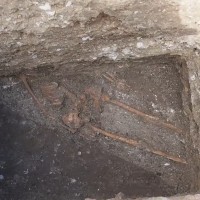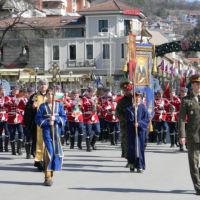
Prison Inmates Find Hoard of 7,000 Ottoman Silver Coins Hidden in 2 Treasure Pots in Bulgaria’s Pleven

The 7,000 Ottoman silver coins found by accident by prisoners from Bulgaria’s Pleven were hidden in the 19th century but were collected over a long period of time. Photo: Pleven Municipality
A hoard of over 7,000 silver coins minted by the Ottoman Empire and hidden in two treasure pots has been discovered by accident by inmates from the prison in the city of Pleven in Northern Bulgaria.
The Ottoman coin hoard with the two broken treasure pots was stumbled upon on November 9, 2018, by prisoners during agricultural work on land owned by the Pleven Prison.
The newly discovered silver treasure, which is believed to have been buried in the ground in the 19th century, was formally presented to the media by the Pleven Regional Museum of History on November 19, 2018.
The 7,046 Ottoman Turkish silver coins in question are of the so called akces, the main monetary unit of the Ottoman Empire.
They weigh a combined total of 8.345 kilograms, and are to be thorough examined by numismatists, and to undergo detailed conservation and restoration.

The two treasure pots with Ottoman silver coins have been discovered during agricultural work by inmates on land owned by the Pleven Prison. Photos: Pleven Regional Museum of History

“They are from different coin issues, and of different face value, and they were probably collected over many years,” says archaeologist Vladimir Naydenov, as cited by the press service of Pleven Municipality.
“It is curious that at the time, this amount of money could buy three houses in Odrin [Edirne] (a former capital of the Ottoman Empire, and a major city in today’s European Turkey – editor’s note),” he adds.
“The 19th century is actually not that well known that is why the treasure [coin hoard] is valuable as a source of historical information,” the archaeologist notes.
The experts from the Pleven Museum of History hypothesize that larger Ottoman coins might have also been buried where the hoard from the treasure pot was discovered. Yet, for the time being no more coins have been found at the spot.
“This treasure is significant for its kind as far as the 19th century is concerned,” Volodya Popov, Director of the Pleven Museum of History, has said.
In his words, no archaeological structures have been found in the area, which is why the burying of the hoard of Ottoman silver coins there was most probably a random act of hiding.

There have been guesses that the coins were hidden in 1877 before the Siege of Plevna in the 12th Russian – Turkish War, which have not been confirmed by the researchers for the time being. Photos: Pleven Municipality





Inmates from the Pleven Prison came across the silver treasure at a depth of about 30 centimeters (1 foot) as they were farming.
Popov has thanked Ivan Petkov, the Director of the prison in Bulgaria’s Pleven, for his quick reaction to rescue the valuable archaeological find.
Initial reports about the accidental discovery quoted Petkov as surmising that the treasure pots with Ottoman silver coins might have been hidden in 1877 before the Siege of Plevna, also known as the Pleven Epopee.
In 1877, Pleven (also known as Plevna at the time), heavily fortified by Ottoman Turkey, was unsuccessfully stormed and then besieged for five months by Russian and Romanian forces during the Russian – Turkish War of 1877 – 1878.
The fragmented medieval Bulgarian Empire was conquered by the invading Ottoman Turks at the end of the 14th century, and the Russian – Turkish War in question resulted in Bulgaria’s national liberation and the establishment of the Third Bulgarian Tsardom (autonomous since 1878, partially unified since 1885, and independent since 1908).
The Director of the Pleven Museum Volodya Popov, however, has disproved the prison director’s guess, making it clear it was too early to hypothesize why the Ottoman coin hoard was hidden.

Pleven Regional Museum of History Director Volodya Popov (middle) is seen presenting the Ottoman treasure pots at the museum 10 days after they were stumbled upon by prisoners. Photos: Pleven Municipality and Pleven Museum of History


Pleven Mayor Georg Spartanski at the first public presentation of the “Pleven Prison Treasure”. Photo: Pleven Municipality
“The discovery of the Ottoman silver treasure is another testimony to the rich history of Pleven’s region. I believe its finding going to provoke writers as an interesting book plot,” Pleven Mayor Georg Spartanski has said at the public presentation of the coin hoard at the Pleven Regional Museum of History.
The Ottoman silver coin hoard found on property of the Pleven Prison is the third time treasure pots from the Ottoman Era have been found in Bulgaria in 2018.
A hoard of 854 silver and gold coins from the Ottoman Empire and Western Europe from the mid-18th century as well as jewelry have been discovered by archaeologists hidden in a treasure pot in late medieval ruins in the Bulgarian Black Sea town of Ahtopol, the successor of the ancient and medieval city of Agathopolis.
Before that a treasure pot of Tatar plunder from ca. 1400, also containing both coins and jewelry, was discovered in the Kaliakra Fortress in August on Cape Kaliakra in Northeast Bulgaria.
****************************************************************************
Support ArchaeologyinBulgaria.com on Patreon
or
Make One-time Donation via Paypal!
Your contribution for free journalism is appreciated!
****************************************************************************






















[…] сообщает Archaeology in Bulgaria, сокровища были зарыты, […]
[…] Source: Prison Inmates Find Hoard of 7,000 Ottoman Silver Coins Hidden in 2 Treasure Pots in Bulgaria’s Pl… […]
[…] Prison Inmates Find Hoard of 7,000 Ottoman Silver Coins Hidden in 2 Treasure Pots in Bulgaria’s Pleven – Archaeology in Bulgaria — Read on archaeologyinbulgaria.com/2018/11/19/prison-inmates-find-hoard-of-7000-ottoman-silver-coins-hidden-i… […]